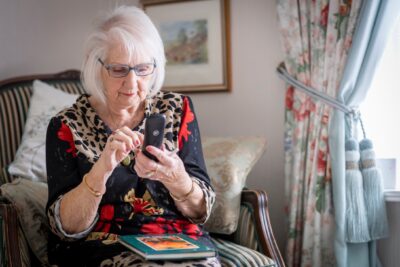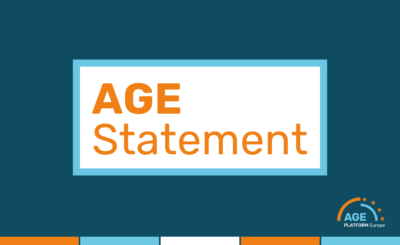
AGE General Assembly

The day was split in two main parts: the morning session tackled statutory issues and policy orientations, and the afternoon was devoted to breakout sessions in which members shared their views on older workers’ employment, adequate minimum old age income, old age poverty and gender pension gap, better access to health and long-term care, universal access to goods and services, and the question of matching the Silver Economy with older persons’ rights and needs.
The meeting closed with the adoption of AGE General Assembly Declaration 2015 (version française disponible ici), which presents the main policy guidelines for AGE work in the coming year. This key document also suggests a number of recommendations for a better recognition and respect of older people’s rights in the European Union.
The 2015 assembly was also the occasion for the seven new AGE member organisations from Portugal, Italy, Croatia, Malta, UK and France to present themselves and meet with other members.

AGE Annual conference
AGE General Assembly was followed by AGE Annual Conference, which has this year examined the ‘EU role in protecting older citizens’ social and economic rights’. The conference welcomed external stakeholders from the civil society, academic and business sectors and provided an insight into current EU policies to protect the rights of older Europeans, with the participation of representatives of the DG Justice, DG Employment, Social Affairs and Inclusion and DG Communications Networks, Content and Technology.

While Mrs Saastamoinen reminded that older people have the same fundamental rights as younger citizens, she reviewed the different initiatives of the European Commission to make this principle closer to reality. At first DG Justice Director mentioned the Commission’s proposal (draft Equal treatment directive) to prohibit among other age discrimination outside employment, which is still blocked at Council by a few EU member states.
As a recent Eurobarometer has unveiled, age still prevails as a major ground for discrimination in the employment field (with more than half of people 55+ discriminated in work) and the Commission is taking a number of actions to promote the employment of older workers and get closer to the 75% employment rate initially targeted as part of the EU2020 growth strategy. These include the Diversity Charters committing companies across the EU on a voluntary basis and a public consultation on better conciliation of work and family life, launched late November, which also addresses the caring responsibilities of working families and mentions a proposal for a carers’ leave directive and minimum standards for care structures for older people. The EU invites AGE members’ views on issues faced by older workers and informal carers of older people.
Mrs Saastamoinen also pointed out the Victims’ Directive, which entered into force on 16 November, as a tool to better protect the older persons from mistreatment, and at global level the United Nations Convention of the Rights of People with Disabilities (UNCRPD) and its implementation at national level. Looking at a new UN convention on older people’ rights, which AGE is advocating for, the European Commission is not convinced that there is a need for such an instrument for developed countries and prefers to focus on the proper implementation of existing tools. To facilitate this, the different standards related to the human rights of older people could be compiled in a single document.
Next to policies and legislation, funding is also part of EU action to promote ageing issue and allows NGOs, such as AGE, to take part in EU debates. Mrs Saastamoinen expressed the European Commission’s satisfaction with AGE essential work, in particular on EU priority topics, such as the EU Social Agenda and the European Semester.

Following the principle of “no mating without meeting”, age-integrated societies focus on settings enabling cross-age interactions and friendships, promoting active participation of seniors and age diversity. Some laws and policies – aimed at being age-friendly – may also sometimes contribute to the distance between age groups, and enforce people’s perception of old age as a time in life characterized by frailty and dependency.
View Prof Pearl Dykstra’s presentation here

Fritz von Nordheim Nielsen also mentioned the European Commission’s concern about the distribution of rights among generations and older people’s issues may appear as potential causes of imbalances. He recommended to AGE to act strategically to advance the rights of older people.
On EU priorities on older workers’ employment, pensions, health and long-term care, Mr. von Nordheim stressed the difficulty faced by EU member states for optimising and reconciling sustainability and adequacy of pensions. In his view, the labour market will play a growing role to finance pension. Pensionable age will increase and people will have to work longer to get the same replacement rate. This, however, will entail potential risks for pension adequacy unless effective careers and employment policies are made in addition to cuts in pensions and along with the development of 2nd and 3rd pension pillars. Social measures such as social minimum pension and a lower number of contributive years required to get a minimum pension for women will be needed as well.

Read Mr. Prache’s presentation here

“Technology and innovation are crucial for the development of the European Silver Economy. They will work best if they support better quality of life, sustainable health and care systems, independence and empowerment”, stated Mr. Krämer, adding “Generation of social impact and innovation should go hand in hand”. To measure the social impact of innovation, the Commission has developed a set of indicators defining the quality of life in the European Union. Involving social scientists and older users in research and innovation programmes is also essential to make sure they deliver effective social results.

Born from a discussion on how to address the e-exclusion of older internet users or users with disabilities, FACIL’iti has been developed to adapt the content on your computer, your tablet, or smartphone and make it universally accessible.
 Mrs Nicole Huige, Strategic Market Development and Public Affairs Director at SCA (Swedish global hygiene and forest products company), dealt with continence care and its important impact on the quality of life and wellbeing of patients and caregivers. 25-50 million people are affected by incontinence in Europe and about 15 million care giving relatives. If not addressed properly, it can lead to a reduction in activities and social interactions
Mrs Nicole Huige, Strategic Market Development and Public Affairs Director at SCA (Swedish global hygiene and forest products company), dealt with continence care and its important impact on the quality of life and wellbeing of patients and caregivers. 25-50 million people are affected by incontinence in Europe and about 15 million care giving relatives. If not addressed properly, it can lead to a reduction in activities and social interactions  and to health problems such as depression. A joint study carried out by SCA and AGE in the framework of their corporate partnership, has revealed that about 20% of people suffering incontinence in the age 65+, to a certain extent dependent on assistance for continence care from others and living in their own home, report not receiving enough support. AGE and SCA will now prepare joint recommendations to be issued during the Global Forum on Incontinence on 19-20 April 2016 in Berlin.
and to health problems such as depression. A joint study carried out by SCA and AGE in the framework of their corporate partnership, has revealed that about 20% of people suffering incontinence in the age 65+, to a certain extent dependent on assistance for continence care from others and living in their own home, report not receiving enough support. AGE and SCA will now prepare joint recommendations to be issued during the Global Forum on Incontinence on 19-20 April 2016 in Berlin.
You can read Ms. Huige’s presentation here
Interested to hear more about this joint study? Please contact Julia Wadoux in AGE Secretariat at julia_wadoux@age-platfomr.eu
The live discussions could be followed with AGE Twitter account: https://twitter.com/AGE_PlatformEU
Useful links:
- AGE General Assembly Declaration: EN - FR - IT
- AGE General Assembly and Annual Conference agenda






